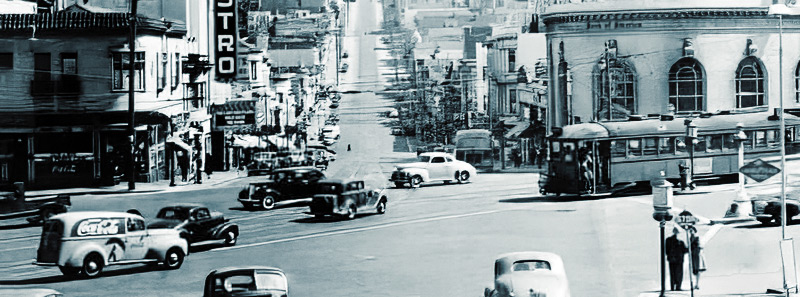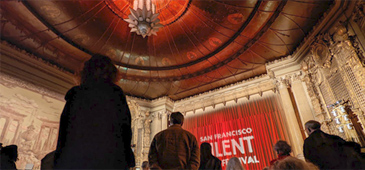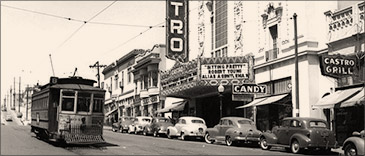The Friends of 1800 is a grassroots, not-for-profit organization dedicated to preserving significant historical buildings, landmarks and the architectural heritage of San Francisco, with a special interest in the identification and recognition of issues and sites important to GLBT history and culture. Go here to read the Friends' Mission Statement and background information about the group.
Our Advocacy area links to preservation efforts by the Friends of 1800 and community groups involved with the New Mission Theater, Harding Theater, U.C. Extension, Sacred Heart Parish, the Fallon Building at 1800 Market St., and more.
SAN FRANCISCO'S LEGACY MOVIE HOUSES
View coverage of moviehouses facing character-defining changes, such as the controversial changes coming to the historic Castro Theatre.
Update: Apple Cinemas has moved into the historic Don Lee building at 1000 Van Ness. Read more on preservation efforts to save and restore San Francisco's legacy movie houses as was the case of the Harding Theater and The Alamo Drafthouse Cinema New Mission.
View tabular listings of closed San Francisco movie houses since 1978, with added links to the comprehensive site Cinema Treasures.
SAN FRANCISCO LANDMARKS
View an extensive listing of officially designated San Francisco Landmarks, as well as San Francisco's Historic Districts and Structures of Merit.
CULTURAL RESOURCE SURVEY
The Friends of 1800 have long advocated for the City of San Francisco to do a comprehensive Cultural Resource Survey of the entire city that will enhance the ability to preserve important buildings on their general historical and aesthetic merits. A Cultural Resource Survey is a basic tool that lays the foundation for the preservation of sites important to LBGT history and culture, and an official recognition of the importance of LGBT history to the culture and history of San Francisco. → More about this.
ALAN MARTINEZ
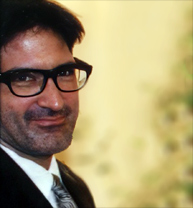
Alan Martinez passed away in April, 2025. Alan brought to the Friends of 1800 his insight as an architect committed to preservation and his understanding of the importance of LGBTQ spaces, evidenced in his essay, Argument for the Possibility of Intentional Queer Space. In his opening remarks to a lecture on architect Mary Colter, Alan defended "cultural continuity and a loyalty toward historic integrity, observing "The idea that a particular and unique local history and culture are impossible or irrelevant in today's 'international' culture is a slogan and an ideology, not a truth. We do have a choice about what we build and make; we are not slaves of what influences us."
In the battle to save and restore the historic Fallon Building at 1800 Market, Alan defended its ornamental and symbolically complex aspects in his essay, Carmen Fallon with Ribbons in Her Hair: "...some 30 years after the first high profile preservation battles such as the effort to save Pennsylvania Station, the practice of using applied ornament in architecture still seems illicit, immoral and unnecessary to many people."
Alan served on the San Francsico Historic Preservation Advisory Board, the San Francsico Historic Preservation Commission, and the Historic Preservation Fund Committee.
Responding to the tragic loss of a family member in 2014, Alan submitted an op-ed to the Guardian — My nephew was killed in Isla Vista. Are you going to remember this time?: "Another gun massacre turned commonplace. A misogynist culture. An unethical media. But my family and I aren't interested in arguing. We want action. We want honest reflection."
See also: Cynthia Laird's tribute to Alan in the Bay Area Reporter published on May 22, 2025.
TOM MAYER
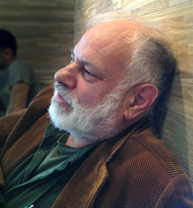
Tom Mayer, a founding member of the Friends of 1800, former Roxie Cinema partner, supporter of Independent Film, LGBT and San Francisco neighborhood grass-roots activist, passed away July 22, 2015. Tom played a critical role in saving and landmarking the historic Fallon Building that had been targeted for demolition. He understood broader issues and had an understanding of the political conflicts at play. Tom had the foresight to extend the group's outreach with an online presence in 1998, and network with both local and national organizations like the National Trust.
Over the years Tom Mayer regularly contributed to San Francisco print and online publications in addition to Wikipedia. His final articles are featured at CineSourceMagazine and Hoodline, covering the 2015 San Francisco Jewish Film Festival. Journalist Jonathan Farrell wrote a moving op-ed about Tom from September 10, 2015 on DigitalJournal.com. Tom Mayer's passion and energy will live on in the hearts and minds of all those he inspired.
